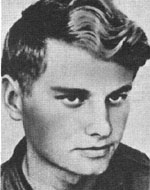Blau, Gershon
Son of Marcus and Olga. He was born on December 18, 1953 in Lvov, Russia. He immigrated to Israel with his family in late 1960. Gershon attended Ramot Elementary School in Givat Hamoreh and graduated from the Afula High School. Gershon was a diligent student and excelled in many professions. He did not need much effort to excel in any field he was involved in. Gershon hated coercion, and in the spirit of free education that his parents gave him, he developed a sense of self-criticism. During his high school studies, he was interested in many fields, and his daily schedule was quite busy: trips with friends, marches and races, basketball and soccer, judo, darts and other classes. He also completed a training course for Gadna commanders and was in training. Gershon was a sociable boy, made friends easily with new acquaintances, often invited them to his home and never was alone. He liked to dress according to the latest fashion and a flag for freedom, and in the long-haired fashion he raised his light hair. Gershon despised manners and claimed that he should excel in everything he was involved in, otherwise it would have no purpose or purpose. He was an independent boy, and he kept his plans for the future. Gershon was drafted into the IDF in August 1972 and volunteered for the Paratroopers Brigade. About two weeks after the end of the course, the Yom Kippur War broke out, and Gershon fought in the eastern Gulf of Suez. Gershon managed to overcome the heavy shock, and at the end of the war he was sent to an officer’s course, and in March 1974 he successfully completed the course and was returned to his battalion. He was not Simcha about this and claimed that he wanted to build his soldiers from the beginning of their military career and not accept a semi-finished product under his command, but tried to leave the platoon. , When the platoon was sent to the Syrian enclave to hold the line and fight the Syrian aggression in the sector “Gershon was different from any other commander we knew” , Said the soldiers of the platoon. “He gained the trust and admiration of every soldier in the platoon, and seemed not to bother at all; It was an integral part of his character as commander, soldier and man. Gershon succeeded in his job and knew how to overcome the crisis that had plagued the department following the departure of the previous platoon commander, who did so perfectly, in his typical way, and already in the opening conversation we realized that he was different and used to speak and clarify things to the satisfaction of all the soldiers. ” As commander of the outpost at the foot of the Hermon, Gershon used to leave the bunker and sit in the observation post during the Syrian shelling, and to report to the soldiers about the place where the shells fell when they took a great deal of risk. In so doing, he created a relatively calm atmosphere for his subordinates and helped them overcome their fears. On the 5th of Iyar 5734 (May 1, 1974) Gershon was killed in a battle in the Golan Heights by a Syrian shell at the outpost, and was brought to rest in the military cemetery in Afula, after which he was promoted to lieutenant and brother. His commander wrote: “Gershon was a person who can not be forgotten. He stood out as a guard for the lives of his men, in order to organize and organize despite the fire, and above all as a brave soldier. He fell while caring for the welfare of his subordinates, in the same spirit in which he lived and acted. “
